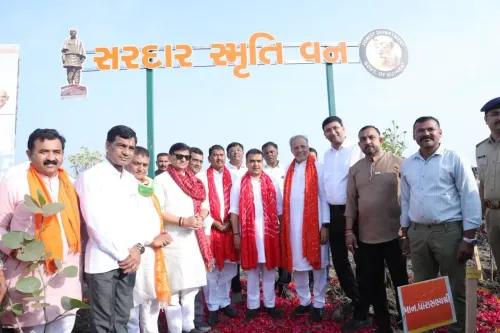How Will GST Reforms Impact Economic Growth in Manipur?

Synopsis
Key Takeaways
- GST on coffee reduced from 18% to 5%.
- Crafts sector sees GST cut from 12% to 5% for wooden products.
- Handloom textiles benefit from a reduction to 5% GST.
- Dairy products now free from GST, boosting affordability.
- Processed food industry gains from a reduced GST to 5%.
New Delhi, Oct 10 (NationPress) The recent reductions in GST rates designed to foster inclusive growth are set to significantly enhance the economy of Manipur, which is primarily centered around small-scale industries, traditional crafts, and agro-based livelihoods, according to a statement released on Friday.
The state’s rich economic landscape, ranging from coffee cultivation in the highlands of Ukhrul and Senapati to bamboo crafts and stone carving in Churachandpur and Imphal, is largely powered by local communities.
By reducing input expenses and stimulating demand, the GST cuts to just 5% are aimed at making Manipur's unique products more competitive in both local and international markets.
A significant decrease in GST on packaged coffee from 18% to 5% brings considerable relief to Manipur’s coffee sector, with districts like Ukhrul, Senapati, and Chandel serving as vital hubs for the cultivation of high-quality Arabica varieties.
Approximately 10,000 farmers contribute to coffee cultivation, with the industry generating additional jobs in processing, packaging, and distribution, thereby supporting the entire value chain. These reforms are anticipated to enhance profitability and boost competitiveness in both domestic and export markets.
Manipur's bamboo and cane crafts are traditionally produced by skilled artisans in Churachandpur, Ukhrul, and Tamenglong. With around 120,000 artisans involved, this sector offers supplementary income to rural families.
The reduction of GST from 12% to 5% on furniture, baskets, mats, and other wooden crafts will directly lower prices and encourage demand in both urban and rural markets, while also reinforcing the strength of SMEs and SHGs in the craft sector.
Handloom textiles such as Phanek, Innaphi, and Rani are primarily crafted by women artisans from various regional communities in Imphal, Thoubal, Bishnupur, and Senapati. These crafts not only preserve traditional weaving but also provide consistent income to roughly 250,000 weavers. The GST reduction from 12% to 5% on handloom woven fabrics is expected to enhance affordability for consumers while improving market competitiveness for artisans.
Communities in Imphal, Churachandpur, and Ukhrul are well-known for their expertise in stone carving and sculpture, engaging about 50,000 artisans in this age-old craft.
The reduction in GST on ceramic tableware significantly lowers the costs of raw materials and finished products, enhancing the affordability and competitive edge of Manipur’s stone creations in the global market.
The processed food industry in the state, characterized by numerous SMEs and self-help groups, employs around 150,000 workers. The cut in GST to 5% on processed food items like pickles, bamboo shoots, and fermented foods is a substantial boost for both producers and consumers.
Additionally, dairy farming in Imphal, Thoubal, and Bishnupur is predominantly managed by small rural and tribal communities, employing over 100,000 farmers and cooperative members.
The complete elimination of GST on ghee, butter, paneer, and cheese offers considerable relief to consumers, making these essential dairy products more affordable and likely increasing demand.
These revised rates are also expected to lower production costs, which will improve profit margins for farmers and cooperatives, enhancing their competitiveness in both domestic and international markets. Collectively, these reforms support a balanced and inclusive growth model, empowering the Northeastern states of India to make a more significant contribution to the national economy, as stated.










